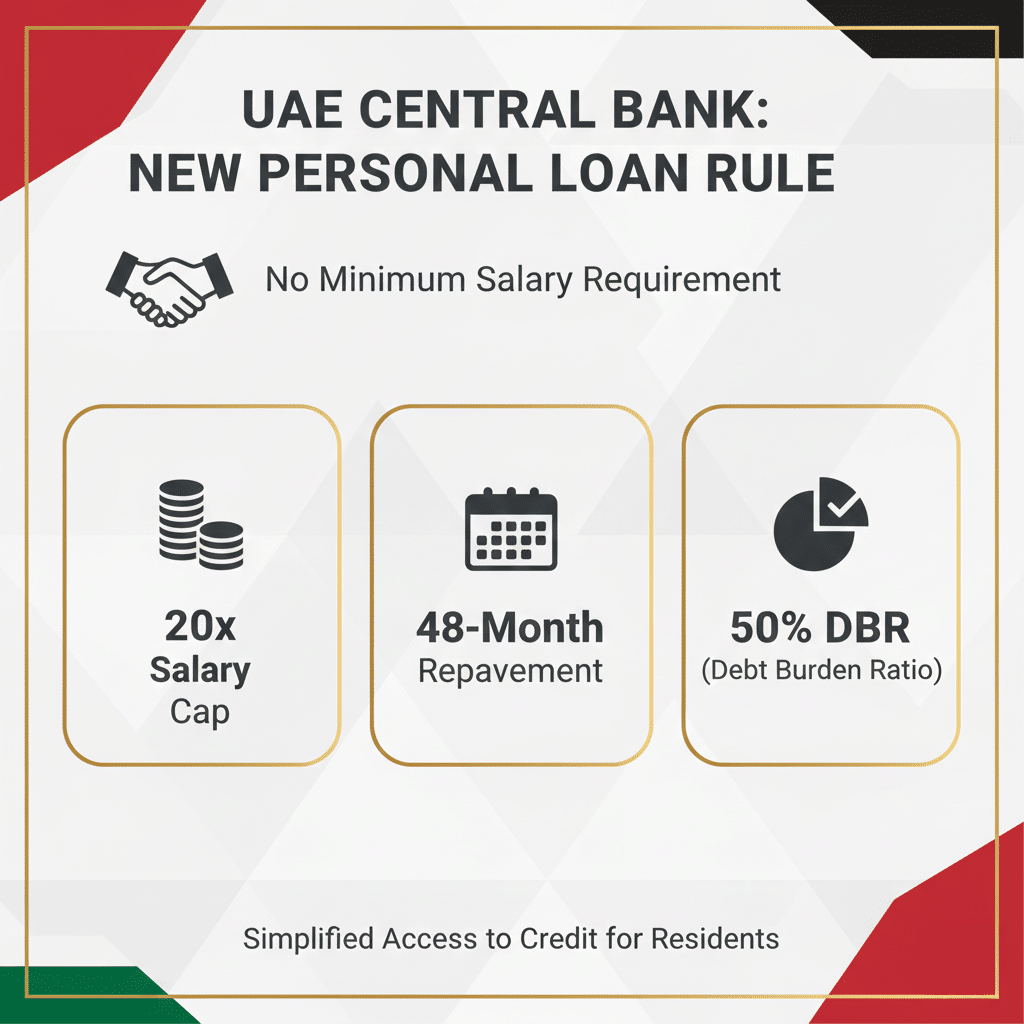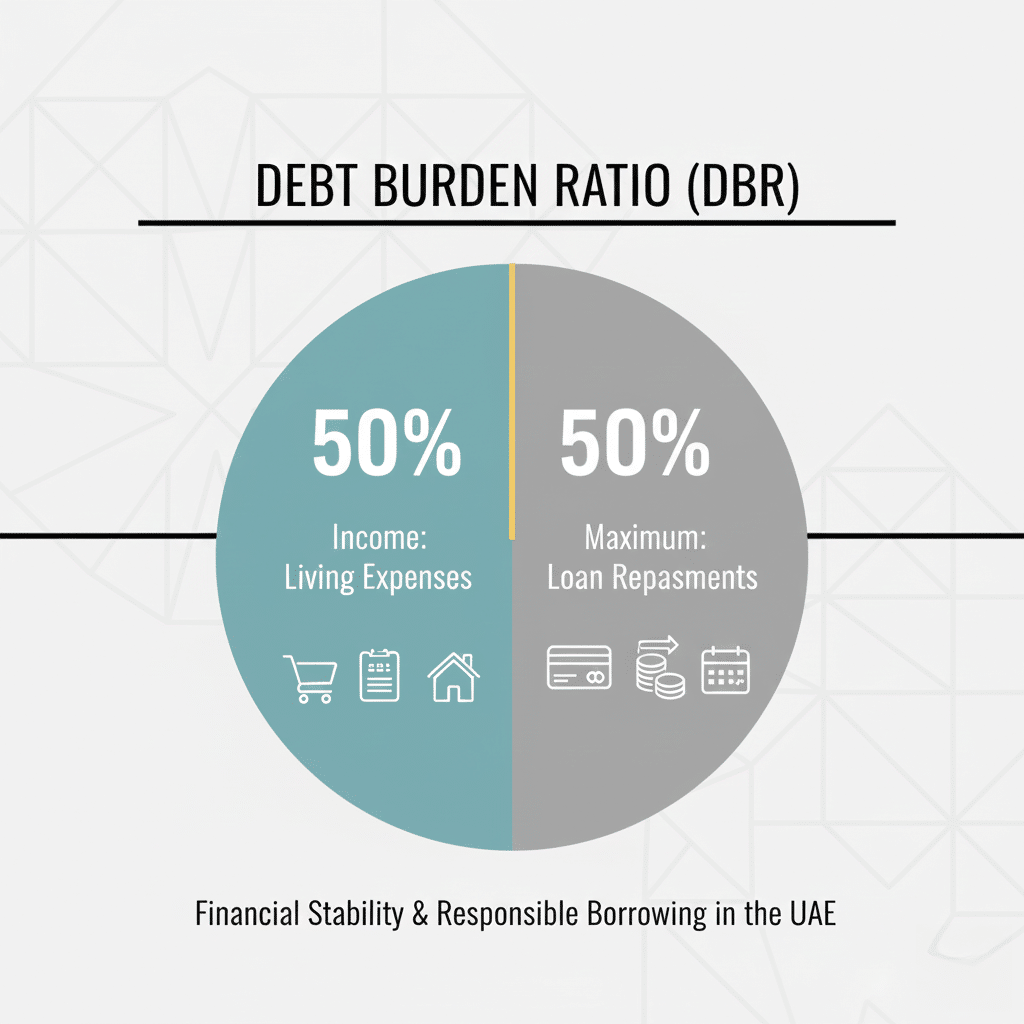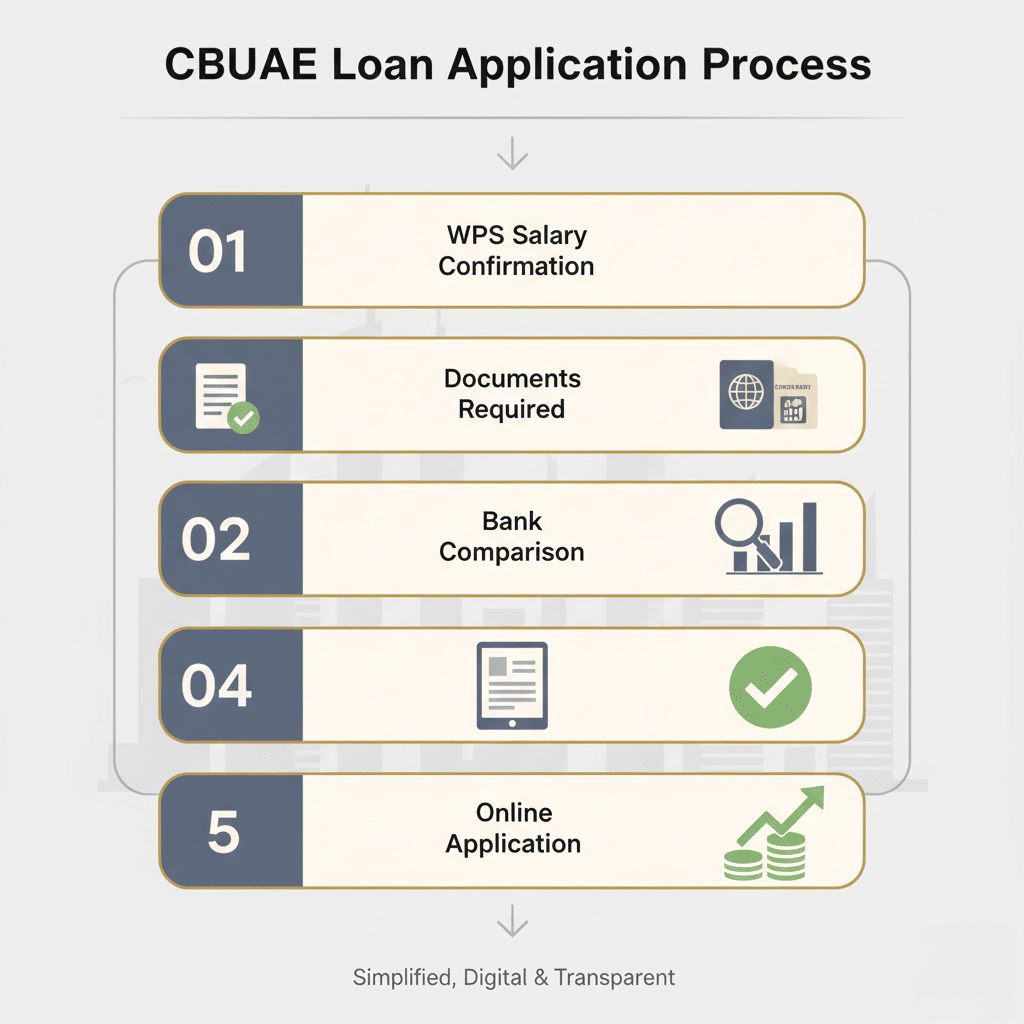For years, accessing a personal loan in the UAE has been a significant challenge for a large segment of the resident population. The widely enforced AED 5,000 minimum salary requirement acted as a barrier, leaving many hard-working individuals outside the formal credit system. That era is now over. In a landmark policy shift for 2025, the Central Bank of the UAE (CBUAE) has officially said no minimum salary requirement for personal loans going forward.
This is more than just a rule change; it’s a fundamental step towards greater financial inclusion for all. If you are a low-salary earner, this is your definitive, official guide from the CBUAE. We will explain exactly what the new personal loan rules mean, who stands to benefit, and provide a clear, step-by-step roadmap on how you can successfully apply for a loan and take control of your financial future.
Understanding the New UAE Personal Loan Rules: What’s Changed?
The new regulatory framework for personal loans is designed to be more flexible, inclusive, and responsive to the diverse economic realities of UAE residents. At its core, this change empowers individual banks and financial institutions to assess loan applications based on their own risk appetite and criteria, rather than a single, rigid salary requirement set by the CBUAE. The mission is clear: to enhance financial inclusion and provide safe, regulated access to credit for a wider population.
While this new flexibility is a major development, it is crucial to understand that core consumer protections remain firmly in place. The CBUAE continues to enforce strict regulations to ensure responsible lending and prevent borrowers from becoming over-indebted. These foundational rules are unchanged:
- Maximum Loan Amount: A personal loan cannot exceed 20 times your gross monthly salary.
- Maximum Repayment Period: The loan must be repaid within a maximum period of 48 months (four years).
- Debt Burden Ratio (DBR): The total of all your monthly loan and credit card installments combined cannot exceed 50% of your gross monthly income.
The Old Rule vs. The New Rule: A Clear Comparison
To eliminate any confusion, here is a direct comparison of the personal loan landscape before and after the CBUAE’s 2025 update:
Before the New Rules:
- Mandatory Minimum Salary: A centrally mandated minimum salary, typically AED 5,000, was required by almost all banks for personal loan eligibility.
- Limited Access: This effectively excluded a significant number of residents, including laborers, junior staff, and young professionals, from accessing regulated personal finance.
Under the New 2025 Rules:
- No CBUAE-Mandated Minimum Salary: The CBUAE no longer sets a universal minimum salary requirement for personal loans.
- Bank-Specific Criteria: Each individual bank now has the flexibility to set its own minimum salary criteria based on its internal risk assessment models. This opens the door for loans to be offered at salary levels of AED 4,000, AED 3,000, or even lower, at the bank’s discretion.

Why This Change? The CBUAE’s Mission for Financial Inclusion
This policy shift is a key component of the UAE’s broader national strategy to foster a more inclusive and robust economy. By removing the restrictive salary barrier, the CBUAE aims to integrate a larger portion of the population into the formal banking system. This initiative is designed to empower low-wage earners, young professionals, and skilled laborers by providing them with access to safe, regulated credit for essential needs such as family emergencies, education, or managing unforeseen expenses. Moving these individuals away from unregulated, high-risk lending sources is a critical step towards enhancing financial stability and well-being for all UAE residents.
Your Protections: Understanding the Debt Burden Ratio (DBR)
While access to credit is expanding, consumer protection remains the CBUAE’s highest priority. The most important safeguard for you, the borrower, is the Debt Burden Ratio (DBR). In simple terms, the DBR is a rule that ensures you do not take on more debt than you can reasonably afford to repay.
As mandated by the CBUAE, the total of all your monthly repayments for loans (personal, car, etc.) and credit cards cannot be more than 50% of your total monthly salary. For example, if your salary is AED 4,000, your total monthly debt payments cannot exceed AED 2,000. This regulation prevents predatory lending and ensures that you have sufficient income remaining for your living expenses, protecting your financial health.
The Wage Protection System (WPS): Your Key to Unlocking Loans
The entire framework of the new, more inclusive loan system is built upon a critical piece of UAE financial infrastructure: the Wage Protection System (WPS). From the CBUAE’s perspective, the WPS is the mechanism that makes secure lending to lower-income individuals possible. It provides banks with a trusted, verifiable source of income information, significantly reducing their lending risk.
What is the WPS and How Does It Work?
The Wage Protection System is an electronic salary transfer system that ensures timely and complete payment of workers’ wages. Overseen by the Ministry of Human Resources and Emiratisation (MOHRE) in partnership with the CBUAE, it requires employers to pay their employees through CBUAE-approved banks, exchange houses, or financial institutions. This creates an official, traceable record of your salary payments, confirming your employment and consistent income.
How WPS Serves as Income Proof and Security for Banks
The WPS is the game-changer for getting a personal loan without a traditional salary certificate or with a low income. Here’s why it’s so important:
- Verified Income: When your salary is processed through the WPS, the bank can see a consistent, official record of your monthly earnings directly in your bank statement. This serves as undeniable proof of income, replacing the need for a separate salary slip from your employer.
- Reduced Risk for Lenders: This official verification gives banks the confidence that you have a stable source of income to repay the loan.
- Automated Repayments: Banks can set up direct debit mandates to automatically deduct the loan installment from your account on the day your WPS salary is credited. This automation guarantees timely repayment and further lowers the bank’s risk.
Because of the security and transparency provided by the WPS, banks are now more willing to consider loan applications from individuals who were previously considered too high-risk.

How to Get a Personal Loan in UAE with a Low Salary: A Step-by-Step Guide
Navigating the new loan landscape is straightforward if you follow the right steps. This is the CBUAE’s official advice to help empower you on your journey to financial access.
Step 1: Confirm Your Salary is Processed via WPS
This is the absolute first and most crucial step. Before you approach any bank, confirm with your employer’s HR or accounts department that your salary is correctly registered and processed through the UAE’s Wage Protection System. Your eligibility for these new loan opportunities is entirely dependent on this.
Step 2: Gather Your Essential Documents
While a formal salary certificate may no longer be the primary document, you will still need to provide a standard set of documents for the bank’s “Know Your Customer” (KYC) process. Prepare the following:
- Valid Emirates ID (copy)
- Valid Passport with Residence Visa Page (copy)
- Bank Statements: Typically for the last 3 to 6 months. This is now the key evidence. Your statement must clearly show the regular monthly salary credits coming from your employer via the WPS.
Always call or check the website of your chosen bank to confirm their specific document list, as it can vary slightly.
Step 3: Research and Compare Bank-Specific Requirements
Under the new rules, the power of choice is with you. Since each bank sets its own policies, it is essential to do your research. Do not assume all banks will have the same offer.
- Visit Bank Websites: Look for the “Personal Loans” section and check their updated eligibility criteria.
- Call Customer Service: Speak directly to a bank representative and ask about their minimum salary requirement for personal loans processed via WPS.
- Compare Offers: Look at the interest rates (profit rates for Islamic banks), processing fees, and any other charges. The market is now more competitive. For example, some banks like Dubai Islamic Bank (DIB) may offer loans for individuals with salaries starting from AED 3,000, while other institutions may have a slightly higher threshold for certain loan products. Researching multiple options will help you find the best possible terms.

Official CBUAE Answers to Your Top Questions (FAQ)
To provide maximum clarity, the CBUAE is directly addressing the most common questions about the new personal loan regulations.
What is the new minimum salary for a personal loan in UAE?
There is no longer an official minimum salary for a personal loan that is mandated by the Central Bank of the UAE. Each individual bank and financial institution is now responsible for setting its own minimum salary requirement based on its internal credit and risk policies.
Can I get a loan if my salary is AED 3,000?
Yes, under the new 2025 regulations, it is now possible to get a personal loan with a salary of AED 3,000. While approval is not guaranteed, the new rules empower banks to offer loans to this salary bracket. Your eligibility will depend on your salary being paid through the WPS and meeting the specific criteria of the lending bank, such as your credit history and your employer’s standing.
What if my employer is a non-listed company?
Your employer’s status as a “listed” or “non-listed” company is less important under the new system. The primary requirement is that your employer, regardless of its size or status, must be compliant with and process your salary through the Wage Protection System (WPS). As long as your WPS salary credits are consistent and verifiable in your bank account, you are eligible to apply for a loan.
Do all banks have to give loans without a minimum salary now?
No. The CBUAE has removed the mandatory requirement, which gives banks the flexibility and option to lend to lower salary brackets. It is not a mandate that forces them to do so. Banks remain commercial entities that will make their own lending decisions based on their business strategy and risk assessment. However, the new framework creates a competitive environment that encourages banks to develop products for this previously untapped market segment.

Conclusion: A New Era of Financial Opportunity
The UAE’s personal loan landscape has fundamentally shifted, becoming more inclusive, accessible, and equitable. The removal of the mandatory minimum salary requirement, anchored by the security of the Wage Protection System, means that more residents than ever before have the opportunity to access safe and regulated credit.
This landmark change underscores the Central Bank of the UAE’s unwavering commitment to building a fair and modern financial system that serves everyone in the nation. It empowers you to meet your financial goals, manage life’s unexpected turns, and participate more fully in the UAE’s vibrant economy.
We encourage you to explore your new financial opportunities responsibly. Start by confirming your WPS registration and researching the updated loan products offered by UAE banks. Your path to greater financial inclusion and stability begins today.
Disclaimer: This article provides official information from the Central Bank of the UAE (CBUAE) regarding personal loan regulations. However, specific loan eligibility, terms, and interest rates are determined by individual financial institutions. Applicants should always consult directly with banks for their specific requirements.
Sources & Official Regulations
- Central Bank of the UAE. (2025). Consumer Protection Regulation & Standards for Personal Loans. Based on official circulars and regulations governing licensed financial institutions in the United Arab Emirates.



